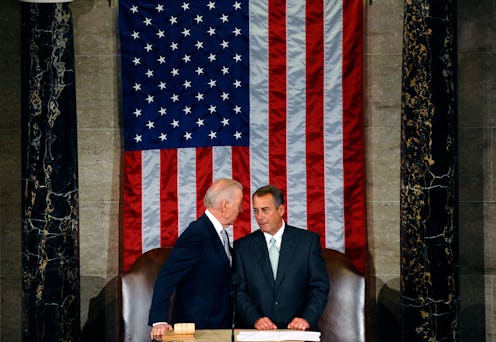News
What Makes The Speaker Of The House So Powerful?
With House Speaker John Boehner resigning his post at the end of October, the political world is in a tizzy. From pundits guessing which representatives might be up for the job, to congressional members shining up their resumes and praying that they'll be noticed by all the right people, it's a wonder that Congress is actually getting anything done. Why is everyone in such a hurry to take up the House reins, and what makes the speaker of the House so powerful that Boehner's sudden departure has prompted so much mayhem?
In short, the House Speaker role is a coveted seat because of its proximity to the presidency. According to the official line of succession, should both the president and vice president suddenly be incapacitated or removed from office, the speaker of the House then takes over as commander in chief. If, for some reason, the speaker is unavailable or removed from the equation, the torch is then passed down to the President pro tempore of the Senate, who is elected by his or her colleagues (the position has customarily been given to the majority party member with the longest Senate record).
Certainly, being second in line to one of the world's most powerful jobs is daunting — but it's not the only reason the speakership is a notoriously sought-after position.
According to congressional dictates, the speaker serves as the gatekeeper for any and all legislation that might be introduced on the House floor, thereby giving him or her enormous power over the country's legislative agenda (typically, the speaker abstains from throwing his or her weight behind any of the legislation that actually makes it to the floor by voting "present," rather than casting a yea or nay vote). Generally, the position goes to the reigning party, although he or she is chosen during an election in which all House members vote. And while the title doesn't necessarily give the holder any specific power over his or her congressional colleagues, it does allow for more control over the discussion itself.
Unlike the majority leader, who acts as the chief executive of the House, and the House majority whip, the speaker doesn't necessarily have to worry about the bills themselves once he or she has opened the gate (the leader is responsible for setting the legislative schedule, and the whip is charged with ensuring that the new legislation actually makes it through to the Senate — e.g. Frank Underwood's early days in House of Cards). Instead, the speaker takes on a broader role for the majority party outside the walls of Capitol Hill.
While the rest of Congress is busying itself with legislative work, the House speaker is making the rounds on the fundraising circuit — a vital cog in the majority party's ability to finance its media and campaign initiatives. In essence, the speaker acts as the public face of the majority party, shaking hands and taking big donations in order to keep the well-oiled congressional machine running. According to The Washington Post, in 2012 Boehner was able to rake in "more than $50 million for GOP congressional candidates" running in that year's election cycle.
In addition to the speaker's fundraising duties, he or she is also in charge of extending important invitations to outside parties — i.e. Israeli Prime Minister Benjamin Netanyahu, or more recently, Pope Francis, who hopped on an outbound flight this week following a successful 10-day papal visit.
From time to time, however, those invitations clash with the speaker's higher-ups. Earlier this year, for example, President Obama himself condemned Boehner's Netanyahu invitation after the speaker failed to alert Obama of the visit (Boehner later explained he had done so to ensure "there was no interference" from the administration). But while it's generally accepted that each invitation will be run by the White House, the speaker is not actually obligated by law to inform the president of his or her plans.
While the speakership isn't necessarily the most powerful seat in Congress, it does carry with it a few, controlling benefits that are hugely enviable. And with Boehner's resignation, coupled with the fractured climate in the reigning Republican party and the ongoing saga to overpower rival Democrats, it's no surprise that anyone and everyone is jockeying for the position.
